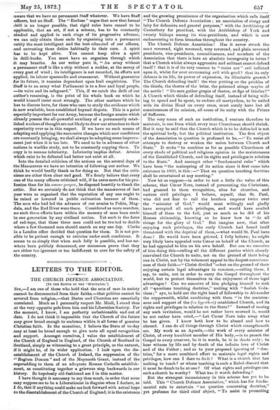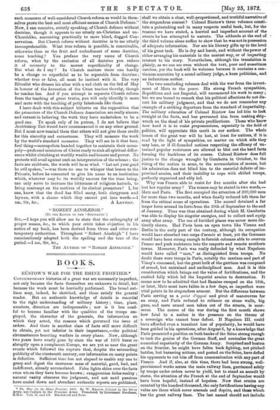LETTERS TO THE EDITOR.
THE CHURCH DEFENCE ASSOCIATION.
[TO THE EDITOR OF THE "SPECTATOR."]
am one of those who hold that the acts of men in society -cannot be disconnected from their faiths,—that politics cannot be _severed from religion,—that States and Churches are essentially correlated. Much as I personally respect Mr. Miall, I stand thus at the very opposite pole from him and his Liberation Society. For the moment, I know, I am perfectly unfashionable and out of d ate. I do not think it impossible that the Church of the future may grow broad enough to embrace within it all forms of genuine Christian faith. In the meantime, I believe the State of to-day may at least be broad enough to give unto all equal recognition And support. Amongst ourselves, I value the establishment of the Church of England in England, of the Church of Scotland in Scotland, simply as witnessing to a great principle, as the earnest, if it might be, of its wider application. • I look upon the die- -establishment of the Church of Ireland, the suppression of the " Regium Donum " and of the Maynooth Grant, instead of the superadding to them of an adequate Roman Catholic establish- ment, as constituting together a grievous step backwards in our history. So hopelessly old-fashioned am I in this matter.
I have thought it necessary to say thus much, in order that none may suppose me to be a Liberationist in disguise when I declare, as I do, that if anything could make me look forward with actual hope to the disestablishment of the Church of England, it is the existence and the growing prominence of the organisation which calls itself "The Church Defence Association ; an association of clergy and laity for defensive and general purposes," with the Archbishop of Canterbury for president, with the Archbishop of York and twenty bishops among its vice-presidents, and which is now endeavouring to form branches throughout the country.
The Church Defence Association ! Has it never struck the most reverend, right reverend, very reverend, and plain reverend presidents, vice-presidents, committeemen, and members of the Association that there is here an absolute incongruity in terms ? that a Church whilst always aggressive and militant cannot defend itself? that it is of its very essence to "resist not" evil inflicted upon it, whilst for ever overcoming evil with good ? that its only defence is its life, its power of expansion, its illimitable growth ? The Church defending itself ! the vine putting on the prickles of the thistle, the thorns of the briar, the poisoned stings maybe of the nettle ! "Do men gather grapes of thorns, or figs of thistles?" A Church which thinks of defending itself, instead of being will- ing to spend and be spent, to endure all martyrdom, to be nailed with its divine Head on every cross, must surely have lost all consciousness of its mission, all sense of its unity with the Prince of Sufferers.
The very name of such an institution, I venture therefore to maintain, is one from which every true Churchman should shrink. But it may be said that the Church which is to be defended is not the spiritual body, but the political institution. The first object of the Association in question is professed to be,—" To resist all attempts to destroy or weaken the union between Church and State." It seeks "to combine as far as possible Churchmen of every shade of political and religious opinion in the maintenance of the Established Church, and its rights and privileges in relation to the State." And amongst other "fundamental rules" which have been "the mainspring of its action since it first came into existence in 1860, is this :—" That no question touching doctrine shall be entertained at any meeting."
Now let us suppose—in order to test a little the value of this scheme, that Cm3ar Nero, instead of persecuting the Christians, had granted to them recognition, sites for churches, and various civil privileges. I believe, myself, that St. Paul, who did not fear to call the heathen emperor twice over the "minister of God," would most willingly and gladly have accepted all such privileges, and would have availed himself of them to the full, just as much as he did of his Roman citizenship, knowing as he knew how to "do all things for the glory of God." But imagine now, that after enjoying such privileges, the early Church had found itself threatened with the deprival of them,—what would St. Paul have done ? He would have been grieved, I fully believe ; he might very likely have appealed unto Caesar on behalf of the Church, as he had appealed to him on his own behalf. But can we conceive of him doing this—calling all the different parties which already convulsed the Church to unite, not on the ground of their being one in Christ, not by the vehement appeal to the deepest conscious- ness of their faith—" Christ divided "—but on the ground of their enjoying certain legal advantages in common,—calling them, I say, to unite, not in order to carry the Gospel throughout the world, but to protect themselves in the enjoyment of those legal advantages ? Can we conceive of him pledging himself to sink all "questions touching doctrine," uniting with "foolish Gala- tians ;" aye, to hold out the right hand of fellowship to Alexander the coppersmith, whilst combining with them " in the mainten- ance and support of the (ex hypothesi) established Church, and its rights and privileges in relation to the State?" Instead of issuing any such invitation, would he not rather have scorned it, would he not rather have cried,—" Let Cmsar Nero take away what he has given. I know both bow to be abased and how to abound. I can do all things through Christ which strengtheneth me. My work as an Apostle,—the work of every minister of Christ, of every humblest member of His body,—is to preach the Gospel to every creature, be it in words, be it in deeds only ; to bear witness by life and by death of the infinite love of Christ and of the Father ; and as to your proposed ignoring of "doe- trine," for a more combined effort to maintain legal rights and privileges, how can I dare to do it ? What is a church that has nothing to teach? or whose teaching is such a Babel-discord that it must be dumb to be at one? Of what rights and privileges can such a church be worthy? What has it worth defending?
But the strangest inconsistency in this scheme has yet to be told. This "Church Defence Association," which has for funda- mental rule to entertain "no question concerning doctrine," yet professes for third chief object, "To assist in promoting such measures of well-considered Church reform as would in them- selves prove the best and most efficient means of Church Defence." Now, I can conceive, strictly speaking, of Church defence without doctrine, though it appears to me utterly an-Christian and un- Churchlike, amounting practically to mere blind, dogged Con- servatism. But Church reform without doctrine is to me utterly incomprehensible. What true reform is possible, is conceivable, otherwise than as the fruit and embodiment of some doctrine, some teaching ? You profane the very name of Church reform, when by the exclusion of all doctrine you reduce it of necessity to the merest superficiality of change. But what do I say ? In Church matters there can hardly be a change so superficial as to be separable from doctrine ; whether true or false, all must be instinct with it. The very Ritualist who dresses his altar with a red cloth on the 3rd of May in honour of the Invention of the Cross teaches thereby, though he teaches lies. And if you attempt to separate Church reform from the teaching of great truths, you will only identify it more and more with the teaching of petty falsehoods like these.
I have dealt with this subject hitherto on the supposition that the promoters of the Church Defence Association are really sincere and earnest in believing the work they have undertaken to be a good one. To speak only of its patron, I do not believe that Archbishop Tait would have countenanced it on any other ground. But I must now remind them that others will not give them credit for this sincerity and earnestness. They will measure the work by the world's standard measures. They will see in it that base, foul thing—monopolists banded together to maintain their mono- poly—professed ministers of Christ ready to sink all spiritual differ- ences whilst clutching at worldly wealth and honour and power. No protests will avail against such an interpretation of the scheme ; the facts are stubborn, the words will be as wind. "Let not your good be evil spoken,"—was there no one to whisper that lesson to the Primate, before he consented to give his name to an institution which, whatever may be its worldly success for the time being, can only serve to increase the bitterness of religious hatreds, to bring contempt on the motives of its clerical promoters? I, for one, know that the deed has filled many, both clergymen and laymen, with a shame which they cannot put into words.—I



































 Previous page
Previous page